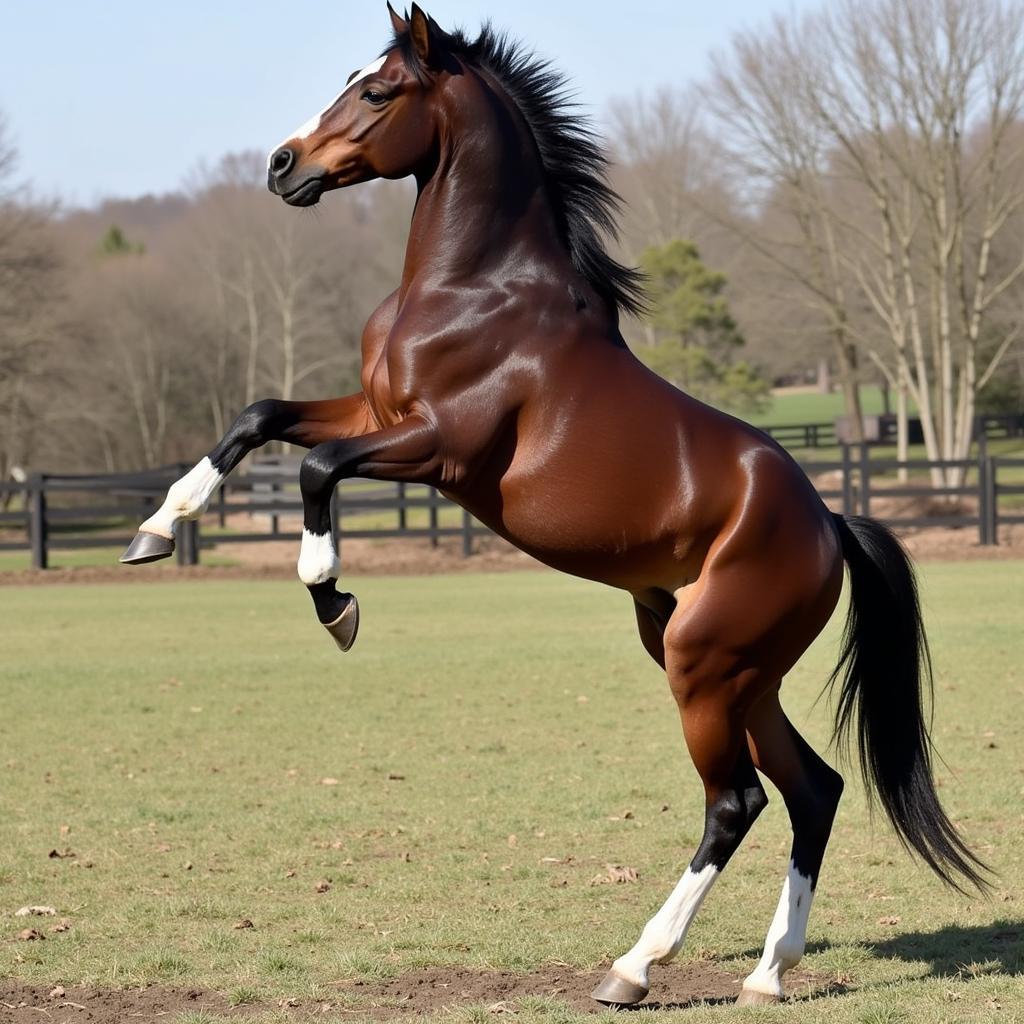Horse Shivers Symptoms are a frustrating and often perplexing issue for horse owners. This debilitating neuromuscular disorder affects a horse’s ability to control its hind limbs, making everyday activities like backing up and picking up their feet a struggle. Let’s delve into recognizing the signs, understanding potential causes, and exploring management strategies for this challenging condition.
Recognizing the Signs: Key Horse Shivers Symptoms
Identifying horse shivers symptoms early is crucial for effective management. While the condition’s name suggests shivering, this isn’t always the primary indicator. The most common sign is a difficulty lifting the hind legs, especially noticeable when backing up or shoeing. Horses may also exhibit trembling or spasms in their hindquarters, tail bobbing, and an overall reluctance to move. The severity of these symptoms can vary greatly, ranging from mild stiffness to a complete inability to move the hind limbs.
What makes horse shivers particularly challenging is its intermittent nature. what is shivers in horses Symptoms can come and go, sometimes disappearing for weeks or even months before returning. This unpredictability can make diagnosis and management even more complex.
What Causes Shivers in Horses?
The exact cause of horse shivers remains unknown, making it a topic of ongoing research. Several theories suggest a potential link to genetic predisposition, nerve dysfunction, or even underlying metabolic issues. Some studies have pointed to an abnormality in the way the horse’s nervous system regulates muscle activity, leading to the characteristic tremors and difficulty coordinating movement.
 Horse struggling to back up, demonstrating a common symptom of shivers.
Horse struggling to back up, demonstrating a common symptom of shivers.
Is There a Cure for Horse Shivers?
Unfortunately, there is no known cure for horse shivers. However, various management strategies can help alleviate symptoms and improve the horse’s quality of life. These include dietary adjustments, targeted exercises, and medications to manage muscle spasms and pain. Working closely with a veterinarian experienced in equine neuromuscular disorders is essential for developing a personalized management plan.
Managing Horse Shivers: Tips for Owners
Living with horse shivers requires dedicated management and a keen understanding of the horse’s individual needs. Here are some key strategies for owners:
-
Regular Exercise: Incorporating appropriate exercise into the horse’s routine can help improve muscle strength and coordination. Low-impact activities like walking and swimming are often recommended.
-
Dietary Management: Some horses benefit from dietary adjustments, such as reducing starch intake and increasing magnesium supplementation.
-
Farrier Care: Regular farrier visits are crucial for maintaining proper hoof balance, which can ease strain on the hind limbs.
-
Veterinary Guidance: Regular check-ups with a veterinarian are essential for monitoring the horse’s progress and adjusting the management plan as needed.
Dr. Emily Carter, DVM, specializing in equine neurology, emphasizes the importance of early intervention: “The sooner horse shivers are recognized and managed, the better the outcome for the horse. Early diagnosis allows for prompt implementation of management strategies to help improve the horse’s quality of life.”
Living with Horse Shivers: A Long-Term Commitment
Horse shivers is a chronic condition that requires ongoing management. While there is no cure, implementing the strategies outlined above, coupled with consistent veterinary care, can significantly improve a horse’s well-being. horse shake Understanding the symptoms and working closely with a veterinarian is key to providing the best possible care for a horse affected by this challenging disorder.
Conclusion
Horse shivers symptoms can be a complex and frustrating challenge for horse owners. Early recognition of these symptoms is vital. While a cure remains elusive, a combination of management strategies can greatly improve the horse’s quality of life. Remember, collaborating with a knowledgeable veterinarian is crucial for developing a tailored management plan to address the unique needs of each horse affected by shivers.
FAQ
- What are the first noticeable signs of horse shivers?
- Can shivers be cured in horses?
- What types of exercises are beneficial for horses with shivers?
- How does diet impact horse shivers?
- What is the role of a farrier in managing horse shivers?
- Is there a genetic component to horse shivers?
- How can I find a veterinarian specializing in equine neuromuscular disorders?
For further information and support, please contact us at Phone: 0772127271, Email: [email protected] or visit our location at QGM2+WX2, Vị Trung, Vị Thuỷ, Hậu Giang, Vietnam. Our customer service team is available 24/7.